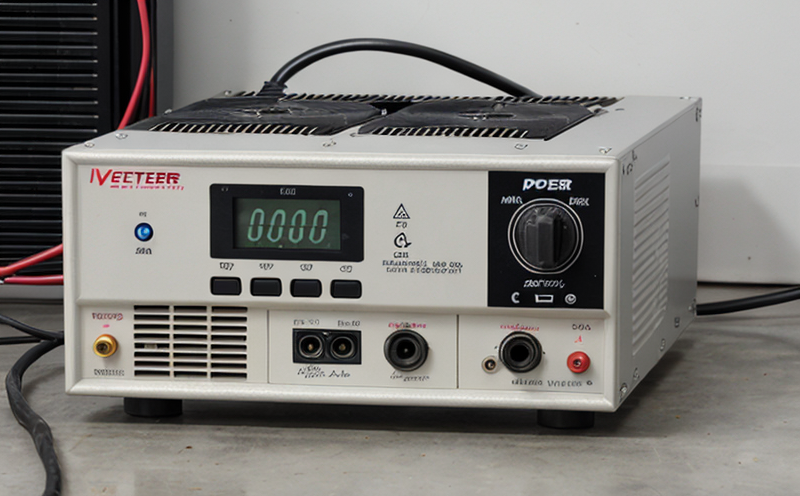IEC 62368 Safety Testing of Audio\/Video and ICT Equipment with Inverters
The International Electrotechnical Commission (IEC) IEC 62368-1, released in 2014, is the first internationally harmonized standard for electrical safety. It provides essential guidelines on how to test and evaluate the safety of audio/video equipment as well as information and communication technology (ICT) devices with inverters.
The standard covers a broad spectrum of tests designed to ensure that equipment meets stringent safety requirements without compromising performance or usability. This includes protection against electric shock, fire hazards, thermal stress, mechanical abuse, and other potential dangers associated with electrical appliances.
Testing according to IEC 62368 ensures compliance with international standards while providing a comprehensive assessment of the safety aspects of equipment used in various sectors such as consumer electronics, medical devices, and renewable energy systems. The standard is particularly relevant for inverters due to their role in converting direct current (DC) from sources like solar panels into alternating current (AC), which powers residential and commercial applications.
Compliance with IEC 62368 can also help manufacturers navigate regulatory requirements across different countries, ensuring consistent quality control through standardized testing procedures. By adhering to this standard, companies demonstrate their commitment to safety and reliability, thereby enhancing brand reputation and customer trust.
The process involves multiple stages including initial risk assessment, detailed design review, manufacturing process evaluation, component selection analysis, and final assembly inspection. Each stage is critical for ensuring that the end product meets all specified criteria outlined in the standard.
Our laboratory adheres strictly to these standards during every phase of testing. Our experienced team employs state-of-the-art equipment and follows rigorous protocols to ensure accurate results. We offer a full range of services including custom test setups, failure analysis, certification support, and ongoing consultation for our clients.
Quality and Reliability Assurance
The process of ensuring that audio/video equipment and ICT devices with inverters meet the stringent requirements set forth by IEC 62368 involves several key steps:
- Risk Assessment: Identifying potential hazards associated with the device.
- Design Review: Analyzing design documents to ensure they comply with safety norms.
- Manufacturing Process Evaluation: Inspecting manufacturing processes for adherence to quality standards.
- Component Selection Analysis: Evaluating components used in the device for their suitability and compliance.
- Final Assembly Inspection: Conducting thorough checks on assembled units before certification.
We employ a team of highly skilled professionals who are well-versed in these procedures. They utilize advanced instrumentation to conduct precise tests, ensuring accurate data collection and interpretation. Our methodologies are designed not only to meet but also exceed the expectations set by IEC 62368, providing our clients with peace of mind knowing that their products will stand up to rigorous scrutiny.
Environmental and Sustainability Contributions
In today's world, sustainability is more important than ever. By adhering to IEC 62368 safety standards during the design and manufacturing process of audio/video equipment and ICT devices with inverters, we contribute positively towards environmental conservation efforts.
- Reduced Risk: Minimizing risks associated with electrical appliances helps prevent accidents, reducing the need for medical interventions and emergency services.
- Energy Efficiency: Ensuring that devices operate efficiently reduces energy consumption, which in turn lowers greenhouse gas emissions.
- Eco-Friendly Materials: Using environmentally friendly materials and processes during production contributes to sustainable practices.
The implementation of these measures supports broader sustainability goals by promoting safer, more efficient products. Additionally, compliance with IEC 62368 helps reduce waste generation throughout the product lifecycle, encouraging reuse and recycling wherever possible.
Use Cases and Application Examples
| Use Case | Description |
|---|---|
| Solar Power Systems | Inverters convert DC from solar panels into AC, making it usable in homes. |
| Data Centers | Inverter-based uninterruptible power supplies (UPS) ensure continuous operation during blackouts. |
| Telecommunications | Backup inverters provide essential communication services even when primary power fails. |
| Consumer Electronics | Protection circuits in audio/video equipment prevent damage from overvoltage and short circuits. |
| Medical Devices | Inverter-powered devices in hospitals ensure reliable operation under all conditions. |
The versatility of inverters makes them indispensable across many industries. The tests conducted according to IEC 62368 are crucial for ensuring that these critical components function safely and reliably within their intended applications.
- Solar Power Systems: Inverters convert DC from solar panels into AC, making it usable in homes.
- Data Centers: Inverter-based uninterruptible power supplies (UPS) ensure continuous operation during blackouts.
- Telecommunications: Backup inverters provide essential communication services even when primary power fails.
- Consumer Electronics: Protection circuits in audio/video equipment prevent damage from overvoltage and short circuits.
- Medical Devices: Inverter-powered devices in hospitals ensure reliable operation under all conditions.
Achieving compliance with IEC 62368 enhances the reputation of manufacturers by demonstrating their ability to produce safe, high-quality products. This is especially valuable when entering new markets or expanding into existing ones where stringent safety regulations apply.





